Baby Bathing – How Often Should You Bathe a Newborn
- First Baby Bath
- Reasons for Delaying Your Baby’s First Bath
- 1 Month – 3 Months
- 3 Months – 6 Months
- 6 Months – 12 Months
- Why Should You Not Bathe Your Baby Every Day?
- How to Keep Infants Clean Between Two Baths
- How Much Water Must Be Used to Bathe a Newborn?
- Bathing Tips for Newborn
- FAQs
Your baby’s bath time can be a tricky experience for you, especially, if it’s a first time with your baby. Your baby may feel so tiny and fragile in your arms and when you go about bathing him, you’re likely to wonder whether or not the temperature of the water is right for your baby and if you’re doing the right job. Another question that you will have is how often you should bathe your baby. If you’ve a newborn, you might think of bathing him less frequently and if your child is a little older, you may bathe him daily. It can be overwhelming no, with your little one? Stop worrying and read this article to know everything you need to know about bathing your baby.
First Baby Bath
Most parents are concerned about how often to bathe a newborn. Here are the important things that you will need to bear in mind when bathing your newborn:
- Most often, it is the nurses who will be the ones to give your baby a bath for the first time. This is done around 24 hours after birth (1). Watch what the nurses are doing and ask them to give you some advice on how and when to bathe a newborn if you are new to it. Any tips by professionals will be beneficial.
- You should bathe your baby only once or twice a week. This is important to follow until the stump of the umbilical cord falls off. You should not submerge your baby in water until the stump is off (2).
- Sponge-bath for newborns is the best way to keep them clean. Be very gentle around their face and while cleaning their heads. Always start from the top and work your way down.
- Additional baths should only be given in case of a mess. For dribbled milk, make sure to clean around the face and neck well. If it is a mess in the diaper, you will need to focus there.
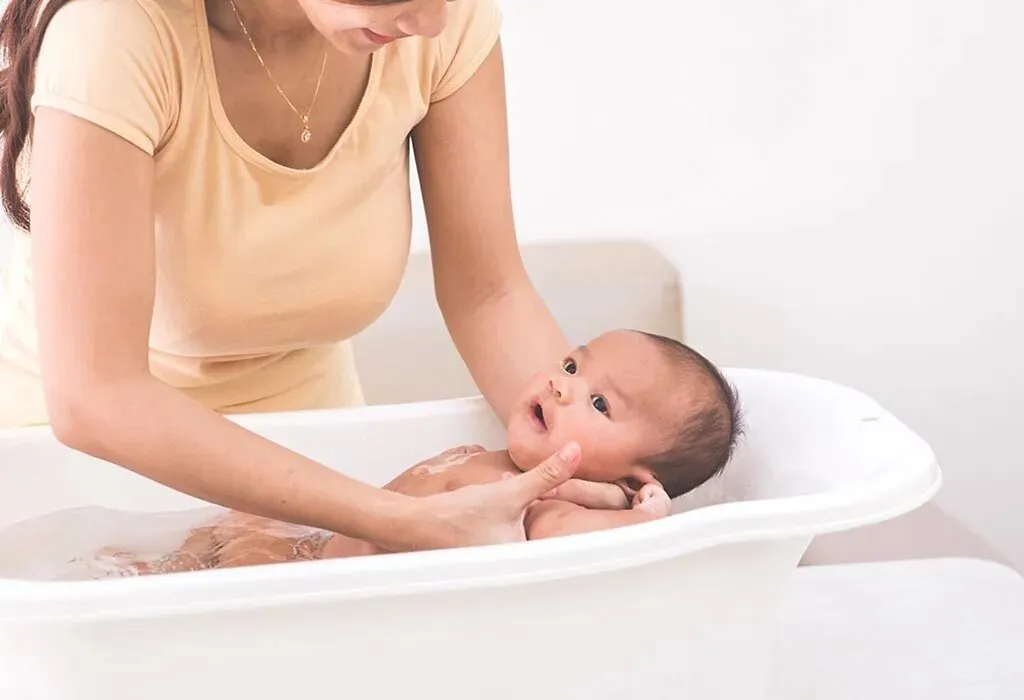
Reasons for Delaying Your Baby’s First Bath
If you don’t know, there are some benefits of delaying the first bath of your newborn. Let’s take a look at them (1) (3):
1. To Prevent Drying Out of Skin
Newborns have super delicate skin as they have just come out into the world. They are born with a good coating of vernix caseosa – a waxy, creamy layer made up of proteins and lipids. This layer of vernix protects a baby’s skin from drying out, regulates the temperature, etc.
Because of a sudden change in the atmosphere of the baby – from a womb to the outside world. To prevent drying out of the skin because of this sudden atmospheric change around the baby, doctors recommend delaying the first bath or wiping the vernix layer after 24 hours of a baby’s birth.
2. To Maintain the Temperature
A sudden change in the climate from a fluid-filled amniotic sac to a drier climate may cause the newborn’s skin to dry out, chap, even. Delaying the bath will help the baby first adjust to the temperature.
3. To Help With Breastfeeding
Delaying a newborn’s first bath also helps with breastfeeding. Babies will learn to latch on easily and have their first meal if they are warm and comfortable. This will also increase the skin-to-skin contact between the mother and the baby.
1 Month – 3 Months
If your baby is 2 months old and you’re wondering how often to bathe him, read this (4):
- For babies between the ages of 1 and 3 months, bathing once or twice a week is recommended. After the stump is gone, you will be able to give your baby a normal bath.
- You can use a bathtub for your baby or give your baby a bath in the sink.
- Be very gentle as you bathe your baby or they might slip.
- Start with the face and then move down, just like you did before. You can use a gentle baby soap while bathing your baby.
- You can also take your baby and bathe them while you have your own bath. If you choose to do this, you need to make sure that you use only lukewarm water and that someone else is there to pass your child to once you are ready to come out of the bath or shower.
3 Months – 6 Months
Though your baby is a little older, he or she is still pretty young and does not move around much. Here is what you need to know about bathing your little one at this age:
- Your baby is still quite young, and will still not need any more than three baths a week. But if you feel like your baby enjoys it, you can bathe him or her more.
- If you want to bathe your baby more than thrice a week, don’t use soap during all their baths. You can either set fixed days for soap, or you can only use it when it is actually necessary.
- After you are done bathing your baby, you can even use a light, fragrance-free lotion that is free of any additional colouring.
6 Months – 12 Months
Babies start getting a lot more active between six months to one year. Your baby will be crawling, or may start walking. Your baby will even start to get weaned onto other food. So obviously, this is when you will need to bathe your baby a little more than previously. Here is what you should do:
- You can increase bath times if the occasion calls for it.
- Now that your baby is sitting up, you will want to start using a baby bathing tub.
- Always keep the bathwater only a few inches deep. If your baby dislikes being bathed, you can get a few toys that will keep him or her distracted.
- If your baby is calm after a warm bath, you can even try adding it to your baby’s nighttime routine so that you and your baby can enjoy a good night’s sleep.
Why Should You Not Bathe Your Baby Every Day?
Some people may find it odd to bathe their babies so few times in a week. However, it is important to note that you do not really need to. Babies do not get dirty the way that adults do and so babies need baths only a few times a week. Your baby’s skin is also so much more sensitive than yours, so bathing too often will have the opposite effect of what you actually want.
Bathing your little one too often could actually trigger skin problems such as eczema. Even if you bathe your baby too little, you will have problems like rashes, etc. If you want to avoid triggering problems like eczema, you can bath your baby and moisturise his skin with a good baby lotion that will not cause irritation (5).
If your baby already has a skin problem, you can speak with your doctor and get a proper skin care plan for your baby that will suit their issue and bring healing.
How to Keep Infants Clean Between Two Baths
Just because you don’t keep bathing your baby every day, it does not mean that you don’t need to make sure that your baby is clean. It is important to make sure that certain areas of your baby’s body remain clean.
As babies tend to dribble and drool a lot, you need to always ensure to wipe down their faces. Make sure that you gently lift the chin and clean under the neck as milk and drool can slide down and cause rashes if not cleaned.
In the same way, you should be sure to clean your baby’s genital areas frequently. If your little boy is not circumcised, you will need to gently pull back the foreskin and clean around the area. This way you will not have any build-up of urine. If you are unsure how to do this, be sure to ask the nurse at the hospital.
For girls, there are folds around the vagina that need a good cleaning every day as well. Your little one will need to have their bottom cleaned well.
Always ensure to use lotion to moisturise the skin that has been cleaned. This will make sure that the sensitive baby skin does not get dry.
How Much Water Must Be Used to Bathe a Newborn?
When bathing a newborn, you can simply fill a bowl with water and clean your baby using a sponge or gentle washcloth. It is important to make sure that your baby stays warm, so you should keep your baby wrapped up in a bath towel and only expose the parts of your baby that you are cleaning.
Bathing Tips for Newborn
Be it newcomers or experienced, bathing a newborn is always a delicate process. That is why we bring you some helpful tips on how often to bathe an infant and what you should or shouldn’t use (1) (2) (5) (6).
1. Prepare Everything Beforehand
Have a towel, mild baby soap, washcloth, clean diaper, and clothes ready before you begin to keep bath time smooth and stress-free.
2. Start From the Top and Work Down
Begin by gently washing your baby’s head and hair, then move down the body. Use a soft, clean washcloth to soap and rinse your baby with care.
3. Focus on Folds and Creases
Babies often have skin folds around the neck, thighs, and arms. These areas can trap milk, moisture, and bacteria; be sure to clean them gently but thoroughly.
4. Clean Hands and Feet Thoroughly
Since babies often put their hands and feet in their mouths, wash their palms, fingers, toes, and soles well to prevent infection.
5. Use Lukewarm Water
Ensure the water is around 37°C (98.6°F), comfortably warm, not hot. Always test the water with your wrist or elbow first.
6. Choose the Right Products
Use only mild, paediatrician-approved baby products. Avoid soaps with dyes, phthalates, sulphates, or harsh fragrances to protect your baby’s sensitive skin.
7. Sponge Baths First
Until the umbilical cord stump falls off, give sponge baths using a soft damp cloth instead of immersing your baby in water.
8. Consider Using a Sink or Baby Tub
If your sink is spacious and clean, it can double as a baby bath. Otherwise, a baby bathtub works well. Introduce your baby gradually to new bath setups to prevent slips or discomfort.
9. Keep Baths Short and Sweet
Limit baths to 5-10 minutes to avoid your baby getting cold. Always keep the room warm and wrap them in a soft towel afterwards.
10. Support Your Baby Properly
Use one hand to support your baby’s head and neck at all times, especially for newborns who cannot yet hold their head up.
FAQs
1. Can I use regular soap or shampoo for my newborn?
No. Always use paediatrician-approved, mild, and fragrance-free baby products. Adult soaps and shampoos can be too harsh and may irritate a newborn’s delicate skin and eyes (5).
2. What if my baby cries during bath time?
If your baby cries during bath time, it may be due to discomfort, unfamiliar sensations, or feeling cold. Try making the experience more soothing by warming the room, using a soft washcloth, and keeping the water at a cosy temperature. Singing, talking calmly, or placing a warm wet cloth over their tummy can also help them feel secure.
How often to bathe babies can sometimes be of concern to new parents. While, at first, it may feel a little uncomfortable for you to not bathe your child every day, you will soon realise the many benefits of it. Do not over bathe your baby, or bathe your baby too little either. Babies need a good balance of bathing, just as with everything else. If you are still unsure about something or your baby has a particular skin ailment that may require special treatment, you can speak with your doctor to formulate a plan to take care of your baby.
References/Resources:
1. American Academy of Pediatrics – Bathing Your Baby
2. American Academy of Dermatology – HOW TO BATHE YOUR NEWBORN
3. Cleveland Clinic – Newborn’s First Bath: The Benefits of Waiting
4. NHS – Washing and bathing your baby
5. Stanford Medicine Children’s Health – Bathing and Skin Care for the Newborn
6. University of New Mexico Health – Baby’s First Bath: 5 Tips for New Parents
Also Read:
Co-Bathing with Infant
Sponge Bath vs Tub Bath for Infants
Ideal Water Temperature for Infant Bath
Epsom Salt Bath for Babies and Kids
Was This Article Helpful?
Parenting is a huge responsibility, for you as a caregiver, but also for us as a parenting content platform. We understand that and take our responsibility of creating credible content seriously. FirstCry Parenting articles are written and published only after extensive research using factually sound references to deliver quality content that is accurate, validated by experts, and completely reliable. To understand how we go about creating content that is credible, read our editorial policy here.







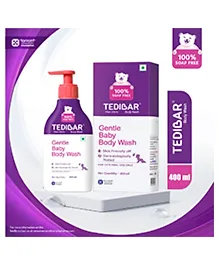
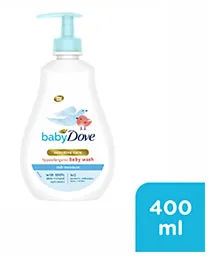

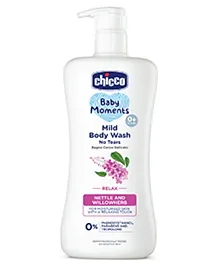

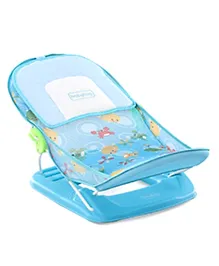
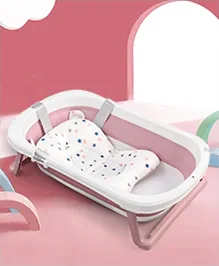
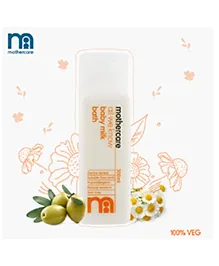
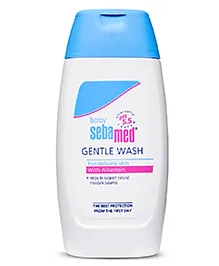
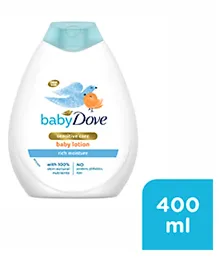



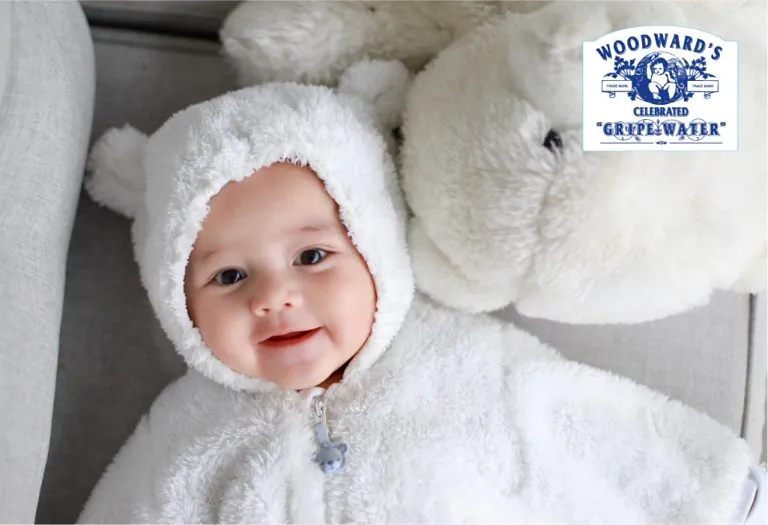
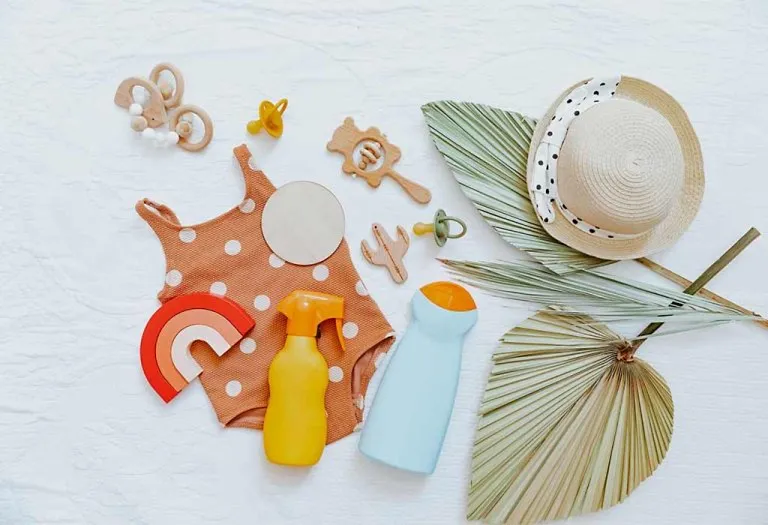


.svg)


















